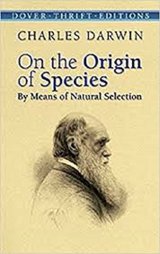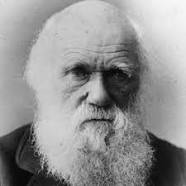On the Origin of Species By Means of Natural Selection Page #12
On the Origin of Species, published on 24 November 1859, is a work of scientific literature by Charles Darwin which is considered to be the foundation of evolutionary biology. Darwin's book introduced the scientific theory that populations evolve over the course of generations through a process of natural selection.
To sum up on the origin of our Domestic Races of animals and plants. I believe that the conditions of life, from their action on the reproductive system, are so far of the highest importance as causing variability. I do not believe that variability is an inherent and necessary contingency, under all circumstances, with all organic beings, as some authors have thought. The effects of variability are modified by various degrees of inheritance and of reversion. Variability is governed by many unknown laws, more especially by that of correlation of growth. Something may be attributed to the direct action of the conditions of life. Something must be attributed to use and disuse. The final result is thus rendered infinitely complex. In some cases, I do not doubt that the intercrossing of species, aboriginally distinct, has played an important part in the origin of our domestic productions. When in any country several domestic breeds have once been established, their occasional intercrossing, with the aid of selection, has, no doubt, largely aided in the formation of new sub-breeds; but the importance of the crossing of varieties has, I believe, been greatly exaggerated, both in regard to animals and to those plants which are propagated by seed. In plants which are temporarily propagated by cuttings, buds, etc., the importance of the crossing both of distinct species and of varieties is immense; for the cultivator here quite disregards the extreme variability both of hybrids and mongrels, and the frequent sterility of hybrids; but the cases of plants not propagated by seed are of little importance to us, for their endurance is only temporary. Over all these causes of Change I am convinced that the accumulative action of Selection, whether applied methodically and more quickly, or unconsciously and more slowly, but more efficiently, is by far the predominant Power. 2. VARIATION UNDER NATURE. Variability. Individual differences. Doubtful species. Wide ranging, much diffused, and common species vary most. Species of the larger genera in any country vary more than the species of the smaller genera. Many of the species of the larger genera resemble varieties in being very closely, but unequally, related to each other, and in having restricted ranges. Before applying the principles arrived at in the last chapter to organic beings in a state of nature, we must briefly discuss whether these latter are subject to any variation. To treat this subject at all properly, a long catalogue of dry facts should be given; but these I shall reserve for my future work. Nor shall I here discuss the various definitions which have been given of the term species. No one definition has as yet satisfied all naturalists; yet every naturalist knows vaguely what he means when he speaks of a species. Generally the term includes the unknown element of a distinct act of creation. The term "variety" is almost equally difficult to define; but here community of descent is almost universally implied, though it can rarely be proved. We have also what are called monstrosities; but they graduate into varieties. By a monstrosity I presume is meant some considerable deviation of structure in one part, either injurious to or not useful to the species, and not generally propagated. Some authors use the term "variation" in a technical sense, as implying a modification directly due to the physical conditions of life; and "variations" in this sense are supposed not to be inherited: but who can say that the dwarfed condition of shells in the brackish waters of the Baltic, or dwarfed plants on Alpine summits, or the thicker fur of an animal from far northwards, would not in some cases be inherited for at least some few generations? and in this case I presume that the form would be called a variety. Again, we have many slight differences which may be called individual differences, such as are known frequently to appear in the offspring from the same parents, or which may be presumed to have thus arisen, from being frequently observed in the individuals of the same species inhabiting the same confined locality. No one supposes that all the individuals of the same species are cast in the very same mould. These individual differences are highly important for us, as they afford materials for natural selection to accumulate, in the same manner as man can accumulate in any given direction individual differences in his domesticated productions. These individual differences generally affect what naturalists consider unimportant parts; but I could show by a long catalogue of facts, that parts which must be called important, whether viewed under a physiological or classificatory point of view, sometimes vary in the individuals of the same species. I am convinced that the most experienced naturalist would be surprised at the number of the cases of variability, even in important parts of structure, which he could collect on good authority, as I have collected, during a course of years. It should be remembered that systematists are far from pleased at finding variability in important characters, and that there are not many men who will laboriously examine internal and important organs, and compare them in many specimens of the same species. I should never have expected that the branching of the main nerves close to the great central ganglion of an insect would have been variable in the same species; I should have expected that changes of this nature could have been effected only by slow degrees: yet quite recently Mr. Lubbock has shown a degree of variability in these main nerves in Coccus, which may almost be compared to the irregular branching of the stem of a tree. This philosophical naturalist, I may add, has also quite recently shown that the muscles in the larvae of certain insects are very far from uniform. Authors sometimes argue in a circle when they state that important organs never vary; for these same authors practically rank that character as important (as some few naturalists have honestly confessed) which does not vary; and, under this point of view, no instance of an important part varying will ever be found: but under any other point of view many instances assuredly can be given.
Translation
Translate and read this book in other languages:
Select another language:
- - Select -
- 简体中文 (Chinese - Simplified)
- 繁體中文 (Chinese - Traditional)
- Español (Spanish)
- Esperanto (Esperanto)
- 日本語 (Japanese)
- Português (Portuguese)
- Deutsch (German)
- العربية (Arabic)
- Français (French)
- Русский (Russian)
- ಕನ್ನಡ (Kannada)
- 한국어 (Korean)
- עברית (Hebrew)
- Gaeilge (Irish)
- Українська (Ukrainian)
- اردو (Urdu)
- Magyar (Hungarian)
- मानक हिन्दी (Hindi)
- Indonesia (Indonesian)
- Italiano (Italian)
- தமிழ் (Tamil)
- Türkçe (Turkish)
- తెలుగు (Telugu)
- ภาษาไทย (Thai)
- Tiếng Việt (Vietnamese)
- Čeština (Czech)
- Polski (Polish)
- Bahasa Indonesia (Indonesian)
- Românește (Romanian)
- Nederlands (Dutch)
- Ελληνικά (Greek)
- Latinum (Latin)
- Svenska (Swedish)
- Dansk (Danish)
- Suomi (Finnish)
- فارسی (Persian)
- ייִדיש (Yiddish)
- հայերեն (Armenian)
- Norsk (Norwegian)
- English (English)
Citation
Use the citation below to add this book to your bibliography:
Style:MLAChicagoAPA
"On the Origin of Species By Means of Natural Selection Books." Literature.com. STANDS4 LLC, 2025. Web. 10 Jan. 2025. <https://www.literature.com/book/on_the_origin_of_species_by_means_of_natural_selection_323>.




Discuss this On the Origin of Species By Means of Natural Selection book with the community:
Report Comment
We're doing our best to make sure our content is useful, accurate and safe.
If by any chance you spot an inappropriate comment while navigating through our website please use this form to let us know, and we'll take care of it shortly.
Attachment
You need to be logged in to favorite.
Log In